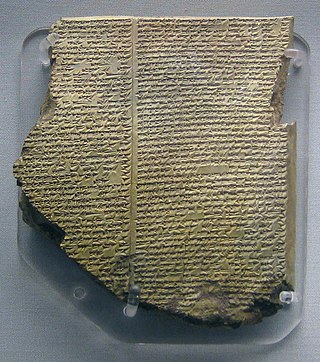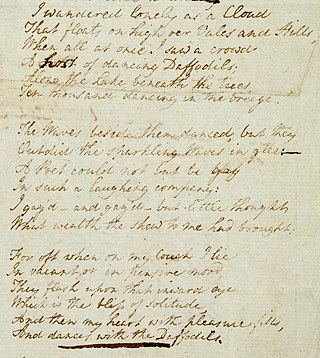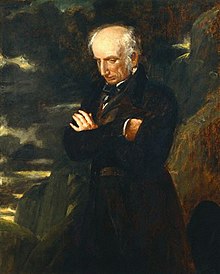
An epic poem, or simply an epic, is a lengthy narrative poem typically about the extraordinary deeds of extraordinary characters who, in dealings with gods or other superhuman forces, gave shape to the mortal universe for their descendants.

An epigram is a brief, interesting, memorable, sometimes surprising or satirical statement. The word derives from the Greek ἐπίγραμμα. This literary device has been practiced for over two millennia.
A heroic couplet is a traditional form for English poetry, commonly used in epic and narrative poetry, and consisting of a rhyming pair of lines in iambic pentameter. Use of the heroic couplet was pioneered by Geoffrey Chaucer in the Legend of Good Women and the Canterbury Tales, and generally considered to have been perfected by John Dryden and Alexander Pope in the Restoration Age and early 18th century respectively.

Hubert Horatio Humphrey Jr. was an American politician and statesman who served as the 38th vice president of the United States from 1965 to 1969. He twice served in the United States Senate, representing Minnesota from 1949 to 1964 and 1971 to 1978. As a senator he was a major leader of modern liberalism in the United States. As President Lyndon B. Johnson's vice president, he supported the controversial Vietnam War. An intensely divided Democratic Party nominated him in the 1968 presidential election, which he lost to Republican nominee Richard Nixon.

John Dryden was an English poet, literary critic, translator, and playwright who in 1668 was appointed England's first Poet Laureate.
The Prelude or, Growth of a Poet's Mind; An Autobiographical Poem is an autobiographical poem in blank verse by the English poet William Wordsworth. Intended as the introduction to the more philosophical poem The Recluse, which Wordsworth never finished, The Prelude is an extremely personal work and reveals many details of Wordsworth's life.

"I Wandered Lonely as a Cloud" is a lyric poem by William Wordsworth. It is one of his most popular, and was inspired by a forest encounter on 15 April 1802 that included himself, his younger sister Dorothy and a "long belt" of daffodils. Written in 1804, it was first published in 1807 in Poems, in Two Volumes, and as a revision in 1815.
In Latin literature, Augustan poetry is the poetry that flourished during the reign of Caesar Augustus as Emperor of Rome, most notably including the works of Virgil, Horace, and Ovid. In English literature, Augustan poetry is a branch of Augustan literature, and refers to the poetry of the 18th century, specifically the first half of the century. The term comes most originally from a term that George I had used for himself. He saw himself as an Augustus. Therefore, the British poets picked up that term as a way of referring to their endeavours, for it fit in another respect: 18th-century English poetry was political, satirical, and marked by the central philosophical problem of whether the individual or society took precedence as the subject of the verse.
The adjective elegiac has two possible meanings. First, it can refer to something of, relating to, or involving, an elegy or something that expresses similar mournfulness or sorrow. Second, it can refer more specifically to poetry composed in the form of elegiac couplets.
Citizenship in a Republic is the title of a speech given by Theodore Roosevelt, former President of the United States, at the Sorbonne in Paris, France, on April 23, 1910.

Childe Harold's Pilgrimage is a long narrative poem in four parts written by Lord Byron. The poem was published between 1812 and 1818. Dedicated to "Ianthe", it describes the travels and reflections of a world-weary young man, who is disillusioned with a life of pleasure and revelry and looks for distraction in foreign lands. In a wider sense, it is an expression of the melancholy and disillusionment felt by a generation weary of the wars of the post-Revolutionary and Napoleonic eras. The title comes from the term childe, a medieval title for a young man who was a candidate for knighthood.
The Petrarchan sonnet, also known as the Italian sonnet, is a sonnet named after the Italian poet Francesco Petrarca, although it was not developed by Petrarch himself, but rather by a string of Renaissance poets. Because of the structure of Italian, the rhyme scheme of the Petrarchan sonnet is more easily fulfilled in that language than in English. The original Italian sonnet form consists of a total of fourteen hendecasyllabic lines in two parts, the first part being an octave and the second being a sestet.

William Shakespeare's sonnet 116 was first published in 1609. Its structure and form are a typical example of the Shakespearean sonnet.

"Ode: Intimations of Immortality from Recollections of Early Childhood" is a poem by William Wordsworth, completed in 1804 and published in Poems, in Two Volumes (1807). The poem was completed in two parts, with the first four stanzas written among a series of poems composed in 1802 about childhood. The first part of the poem was completed on 27 March 1802 and a copy was provided to Wordsworth's friend and fellow poet, Samuel Taylor Coleridge, who responded with his own poem, "Dejection: An Ode", in April. The fourth stanza of the ode ends with a question, and Wordsworth was finally able to answer it with seven additional stanzas completed in early 1804. It was first printed as "Ode" in 1807, and it was not until 1815 that it was edited and reworked to the version that is currently known, "Ode: Intimations of Immortality".
"London, 1802" is a poem by the English Romantic poet William Wordsworth. In the poem Wordsworth castigates the English people as stagnant and selfish, and eulogises seventeenth-century poet John Milton.
"Leisure" is a poem by Welsh poet W. H. Davies, appearing originally in his Songs Of Joy and Others, published in 1911 by A. C. Fifield and then in Davies' first anthology Collected Poems by the same publisher in 1916.
An Eton Poetry Book is an anthology edited by Cyril Alington and George Lyttelton, with an introduction by A. C. Benson. The editors' intentions were "to provide poems which boys might reasonably be expected to like" and "to awaken their metrical sense." The book was published in 1925, with a second impression in 1927 and a third in 1938.

"The Lost Leader" is an 1845 poem by Robert Browning first published in his book Dramatic Romances and Lyrics. It berates William Wordsworth for what Browning considered his desertion of the liberal cause, and his lapse from his high idealism. More generally, it is an attack on any liberal leader who has deserted his cause. It is one of Browning's "best known, if not actually best, poems".

The Traveller; or, a Prospect of Society (1764) is a philosophical poem by Oliver Goldsmith. In heroic verse of an Augustan style it discusses the causes of happiness and unhappiness in nations. It was the work which first made Goldsmith's name, and is still considered a classic of mid-18th-century poetry.
J. R. R. Tolkien, a fantasy author and professional philologist, drew on the Old English poem Beowulf for multiple aspects of his Middle-earth legendarium, alongside other influences. He used elements such as names, monsters, and the structure of society in a heroic age. He emulated its style, creating an impression of depth and adopting an elegiac tone. Tolkien admired the way that Beowulf, written by a Christian looking back at a pagan past, just as he was, embodied a "large symbolism" without ever becoming allegorical. He worked to echo the symbolism of life's road and individual heroism in The Lord of the Rings.











